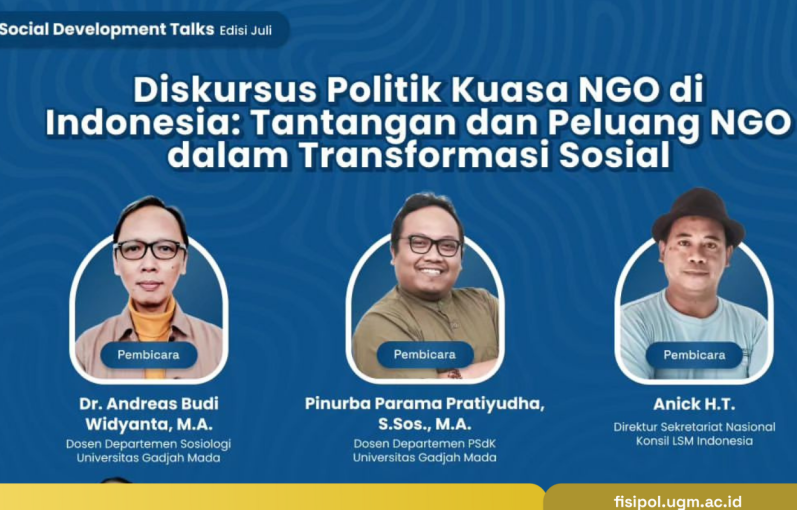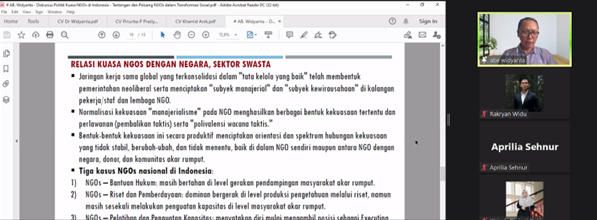
Yogyakarta, 22th of July 2024—In Indonesia, the power relation between the state, grassroots movements, and the private sector has experienced significant change ever since the fall of the New Order two decades prior. Democratization and neoliberal economic policies, which are both part of the concept of “good governance”, have become a dominant discourse which has shaped the identities of NGO workers and its institutions alike. In response to this reality, the latest edition of Social Development Talks, a discussion event, was organized by the Department of Social Welfare and Development with the title of “Discourse of Power Politics of NGOs in Indonesia: Challenges and Opportunities in Social Transformation” through a Zoom Meeting on Monday (22/07).
Andreas Budi Widyanto, as both the main speaker and a lecturer for UGM’s Department of Sociology, explained the complications that had occurred in the NGO movement as the result of the policies of good governance mentioned beforehand. The formation of a neoliberal governmentality over NGOs has caused NGOs to become hybrid organizations in the reformation era.

“NGOs, as a managerial subject from neoliberal governance, are expected to be qualified in handling the complexities of institutions. They have to bear three roles at the same time, which includes doing public service, fundraising and voluntary civil service,” explained Andreas.
According to a CSO Sustainability Index Report done by the Indonesian NGO Council last year, they have highlighted both the legal environment and the flow of funds as factors that inhibit the movement of NGOs in Indonesia. Both the Omnibus Law on Job Creation and the Revision of the KPK Law has narrowed down the movements of NGO due to the investment climate promoted by the government.
“The change of status of Indonesia from a lower-middle income country to a upper–middle income country also has its consequences, as it has led to the reduction of investment by donor agencies. Not just that, the Covid 19 Pandemic a few years back also has its effects,” explained Anick H.T, as the Secretariat Director of the Indonesian NGO Council.
Meanwhile, Pinurba Parama Pratiyudha, as a lecturer for UGM’s Department of Social Welfare and Development, underlined the spirit of NGOs as an organic and voluntary-based movement. According to him, the current climate of NGOs right now raises the question of how far the spirits of voluntarism as the essence of NGO are actually present.
“The reality now is that the voluntarism that we can see is actually confused for the sustainability of said institution, personal welfare, and pragmatism as NGOs start to see itself as career paths,” explained Pinurba.
The current NGO movement, which is demanded to enter the neoliberal wave, has much more similarities with the mindset of the welfare state. This refers to the fact that while the Indonesian constitution claims that Indonesia is a welfare state, the actors in practice are capitalistic in nature. Uniquely, this complexity creates a new form of NGOs arriving from the community with the same spirit and concern, like the Pandawara group for example (A mobilizing group that focuses on the issue of waste and environmental sanitation).
“In order to destroy this inhibiting barrier, we have to bring together three things, like policies, cooperation between NGOs and the state in self-management, and the readiness of local community organizations that are eligible,” said Anick.
The discussion activities in this month’s Social Development Talks is a form of support towards the UN’s Sustainable Development Goals, in particular SDG 16 Peace. Justice, and Strong Institutions and SDG 17 Partnerships for the Goals.
